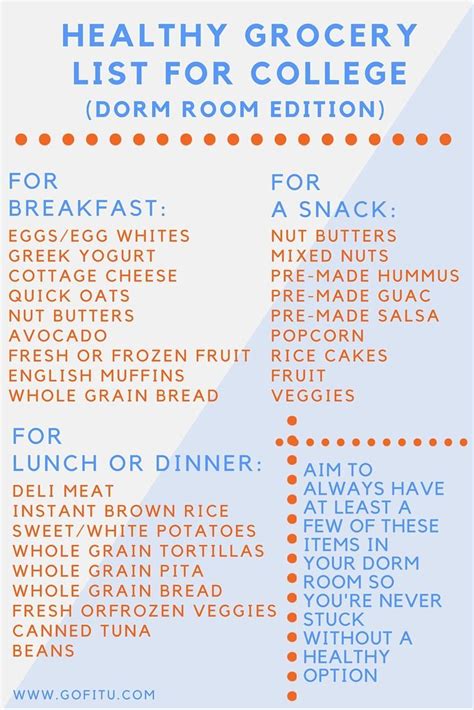Navigating the Challenges of Dorm Dining

Transitioning to college life often presents a unique set of culinary challenges. The limited kitchen facilities and strict meal plans of dorm life can be daunting for students accustomed to home-cooked meals. However, with a little planning and creativity, it’s possible to maintain a balanced and satisfying diet without breaking the bank or sacrificing convenience.
This comprehensive guide to dorm food provides everything you need to know about eating well in a dorm setting, from essential equipment to budget-friendly recipes and time-saving tips.
Essential Dorm Kitchen Equipment
- Microwave: A microwave is a must-have for dorm living. It can quickly heat up leftovers, prepare instant meals, and even cook simple dishes like popcorn and grilled cheese sandwiches.
- Mini-refrigerator: A mini-refrigerator is essential for storing fresh produce, leftovers, and snacks. Choose a model with adequate capacity for your needs and consider features like energy efficiency and adjustable temperature settings.
- Electric kettle: An electric kettle is a convenient way to prepare hot water for tea, coffee, instant soups, and other beverages. It also saves you from having to boil water on the stove or microwave.
- Toaster: A toaster is a great tool for making quick breakfasts and snacks. Choose a model that can accommodate different bread sizes and has adjustable browning settings.
- Blender: A blender can be used to make smoothies, sauces, and soups, providing you with a convenient way to incorporate more fruits and vegetables into your diet.
- Rice cooker: A rice cooker is a great option for cooking rice, grains, and other dishes with minimal effort. It can also be used to steam vegetables and cook small amounts of meat.
Budget-Friendly Dorm Recipes
- Ramen noodles with veggies: Ramen noodles are a dorm staple, but you can make them more nutritious by adding vegetables like broccoli, carrots, or spinach.
- Tuna salad sandwiches: Tuna salad sandwiches are a quick and easy lunch option. Use whole-wheat bread and add vegetables like celery and onion for added nutrients.
- Grilled cheese sandwiches: Grilled cheese sandwiches are a classic comfort food that can be easily made in a dorm microwave. Use whole-wheat bread and add sliced tomatoes for extra flavor.
- Instant oatmeal: Instant oatmeal is a convenient and affordable breakfast option. Choose plain oatmeal and add your own toppings like fruit, nuts, or honey.
- Yogurt parfaits: Yogurt parfaits are a layered dessert or breakfast option that can be made with yogurt, granola, and fruit. They are a good source of protein and fiber.
Time-Saving Dorm Food Tips
- Meal prep on weekends: Set aside some time on weekends to cook and portion meals for the week. This will save you time and money during the busy school week.
- Use leftovers creatively: Leftovers can be used to create new dishes, such as stir-fries, soups, and sandwiches. Get creative and experiment with different flavors and combinations.
- Cook in bulk: Cooking in bulk can save you time and money. Freeze leftovers in individual portions for quick and easy meals throughout the week.
- Utilize dorm dining services: While dorm food may not always be the most glamorous, it can provide a convenient and affordable option for students on a tight budget. Take advantage of the meal plans offered by your dorm and don’t be afraid to ask for substitutions or modifications to accommodate your dietary needs.
Creating a Healthier Dorm Diet
- Prioritize fruits and vegetables: Aim to include fruits and vegetables in every meal. They are packed with essential vitamins, minerals, and fiber.
- Choose lean protein sources: Lean protein sources, such as chicken, fish, beans, and tofu, help you feel full and satisfied without adding excessive calories or fat.
- Limit processed foods: Processed foods are often high in sodium, sugar, and unhealthy fats. They can contribute to weight gain and other health problems.
- Hydrate adequately: Staying hydrated is essential for overall health. Drink plenty of water throughout the day, especially if you are exercising or spending time in hot temperatures.
- Make smart snack choices: When choosing snacks, opt for healthy options like fruit, yogurt, nuts, or whole-wheat crackers. Avoid sugary drinks and processed snacks like chips and candy.
Additional Resources
- The National Institutes of Health (NIH) provides a wealth of information on healthy eating and nutrition: https://www.nih.gov/health-information/health-topics
- The United States Department of Agriculture (USDA) offers a comprehensive guide to healthy eating: https://www.myplate.gov/eat-healthy/myplate-plan
- The College Nutrition Society provides resources and support for college students who are interested in healthy eating: https://www.collegenutrition.org/












